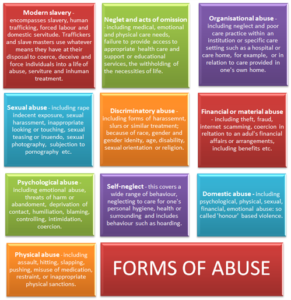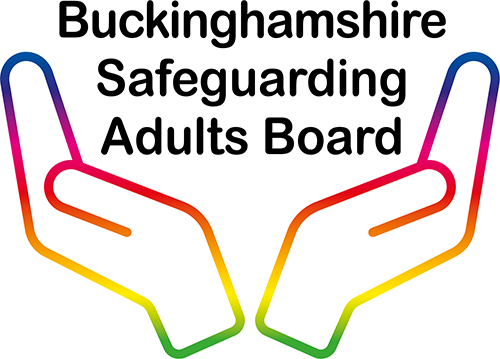Recognising Abuse
This section of the website looks at the various forms of abuse, though it should be recognised that people can be experiencing more than one form of abuse at anyone time.
 What is abuse?
What is abuse?
Abuse is any action that harms another person.Abuse of adults with care and support needs is where someone in a position of trust hurts, harms or causes someone distress.
Abuse is unacceptable; everyone has the right to be treated with dignity and respect and to live free of abuse or mistreatment, whether they live on their own, live with others, live in a care/nursing care home, attend a day centre or are in hospital.
The Care Act 2014 places a duty on local authorities to look into adult safeguarding concerns in relation to and adult who;
- has needs for care and support (whether or not the local authority is meeting any of those needs) and;
- is experiencing, or at risk of, abuse or neglect, and
- as a result of those care and support needs is unable to protect themselves from either the risk of, or the experience of abuse or neglect.
Where does Abuse Occur?
Abuse can happen anywhere – in a residential or nursing home, a hospital, in the workplace, at a day centre or educational establishment, in supported housing or in the street.
Who can Abuse?
 Again anyone can abuse someone else, it can be a member of someone’s family – this would be domestic abuse, or a paid carer, or a totally stranger.
Again anyone can abuse someone else, it can be a member of someone’s family – this would be domestic abuse, or a paid carer, or a totally stranger.
Sometimes people who are caring for someone can abuse them and this can be by accident – through lack of training/knowledge for a paid carer.
However sometimes for a family member or friend who is caring it can be through frustration and anger.
Although these are all types of abuse, the way in which they will be addressed maybe different.
The aim of Safeguarding is always to protect the victim and to stop the abuse occuring, but the way this is acheived can be done differently, including through legal action, discplinaries, through training staff member and offering support to carers etc.
